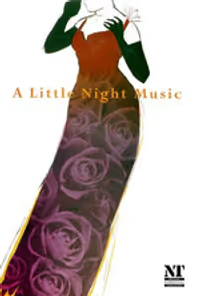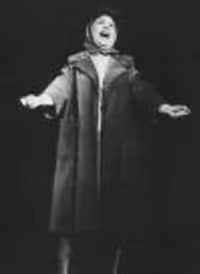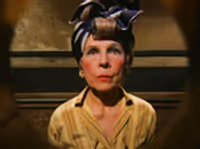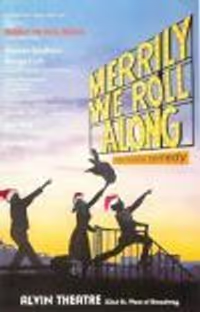Michael Bennett and Jimmy Webb's Scandal! (With Swoozie Kurtz)
Unknown User
Joined: 12/31/69
#1Michael Bennett and Jimmy Webb's Scandal! (With Swoozie Kurtz)
Posted: 5/29/07 at 6:29pm
I posted a long excerpt from Mandelbaum's book on Bennett in the "Sondheim and Prince diss Chorus Line" thread when someone asked about Scandal but thought this deserved it's own post.
Anyone know more details about this show? i've seen two photos (in that book) from the workshop and that's all--I'm a HUGE HUGE Jimmy Webb fan and would particularly like to hear his songs--any show up elsewhere? The show fascinates me soo much--which the basic story sounds a bit sketchy to me (especially the happy ending with the marriage) staging it just sounds so incredible
Here's what I posted (typos, as always, are mine):
Try to track down Mendelbaum's book A Chorus Line and the Musicals of Michael Bennett--I got a used copy from Amazon for a penny plus shipping. It has a chapter on Scandal that was workshopped very thoroughly and sounds *wonderful*--people claim (but of course people like to claim stuff like this) that it was some of the most amazing stuff Bennett had staged.
It was put on hold partly due to his illness but partly too as baker's were afraid to back a musical that was so graphically and blatantly about sex and sexuality during the height of the AIDS crisis. Jimmy Webb's score (I'm a huge Webb fan and he has tons of love and respect for musical theatre--SOndheim in particular so I wish he'd try again to make a musical) was apparantly wonderful too though unrecorded--
Swoozie Kurtz (sp?) starred in the workshop (she stared as Claudia the American woman who goes to Europe for sexual promiscuity and experience)--there was a 14 minute "brilliant' An American Woman in Paris ballet intro. Others in the cast at the workshop were Treat Williams as Robert, David Rasche doubled as Mitch, the husband's best friend and ANdrew his friend/psychiatrist, Victor Garber tripled in three comic roles, FIsher Stevens played the French teenaged waiter, Priscella Lopez was the lesbian Claudia met in Switzerland, Wanda Richert and Trish Ramish were the women Robert saved from the fire and Kelly Bishop played Claudia's best friend and Jerry Mitchell was one of the main male dancers.
its genesis was because of an ex Mary Tyler Moore writer, Treva Silverman had a screenplay that Chorus Line lyricist Ed Kleban took to Bennett--he aske dher about it and she mentioned how she had been going to Europe to rediscover herself and Bennett decided THAT was the story that had theatrical possibilities. It was set to be a play and apparantly Treva's script was "brilliant"-but finally Bennett came across a format that was a modern take on Lady in the Dark--the songs and dance moments--which there were many of--would all be dreams or fantasies of the main character in reaction to what was around her.
He apparantly wanted Sondheim to write the score (man that oculda been wonderful) but Treva is quoted as saying that Bennett held Sondheim in such huge esteem that, while he did ask Steve for lotsa advice, he never got the nerve to ask him to write the score, as he was so afraid of rejection (Sondheim was writing Merrily and later Sunday during this time anyway). Eventually he decided on Jimmy Webb--who he had tried to collaborate with earlier in the 70s on another failed project.
Just as Bennett had gotten the younger choreographer Michael Peters to do a LOT of the actual dancing for Dreamgirls (partly cuz of his experience with black pop dancing), for Scandal, Danny Herman (who later did the Dreamgirls concert--and had been in the cast of Chorus Line) did much of the actual choreography, apparantly brilliantly.
As for the story:
" The show that began a series of workshops on May 1, 1984, contained perhaps the wildest, boldest, and most ribald story of any musical comedy. It was daring, hilarious, and ultimately profoundly moral. It concerned the marriage of Claudia and Robert Miller, which, after eight years has fallen into a patter of sexual staleness. Claudia has been sexually reserved with her husband, and it has begun to make a major difference not only in their marriage but in their ability to communicate with and love each other. Robert has begun seeing other women, and Claudia discovers this when RObert heroically saves several people from a midtown hotel fire. Unfortunately, the woman Robert carried out of the fire, identified on TV and in newspapers the next day as "Mrs. Miller," is not Claudia but a woman he has been seeing and this scandal forced Claudia to file for divorce.
Following an evening at Chippendale's, courtesy of her gossipy best friend, Elaine, plus a disastrous encounter with a hot but vain tennis pro, Claudia decides she's got to change her life. She makes a thoroughly un-Claudia-like decision to go to Europe, where she can be anonymous and see what sex is all about. Her adventures abroad form the body of the show, with occasional cuts back to Robert, including one hilarious sequence between Robert and a psychiatrist gay friend of his, Andrew.
Silverman devised a series of encounters for Claudia of a frankness and explicitness never before encountered in commercial musical theatres. However, by having Claudia constantly interrupt the most provocative situations to share her inner thoughts with the audience, she remained endearing in even the most outlanding situations, and the scenes always retained their humour--be it sometimes sweet, sometimes crude. Claudia has an affair with a sixteen year old waiter in a Paris hotel, then meets a handsome shoe repairman in Rome, who brings another man with him when he arrives for his tryst with Claudia. She finds herself snowbound in a Swiss chalet with Nicole, a woman friend whom she soon realizes is a lesbian.
Silverman: 'She becomes more and more liberated, and realizes what a joyous experience sex can be. She realizes that her husband has been searching for that because he hasn't found it with her. She also realizes she is absolutely in love with her husband. At the end, it is clear that by going through these changes she has become, finally, a perfect partner for him, just as he has had to go through his changes to be a partner for her. It was a love story, and within it was a woman's growth.'
Bennett: 'They get back together because they deal with it as opposed to thinking sex is not important. I think relationships that become compromised, where you settle are not a good idea.'
""The dance high point of Scandal! and possibly Bennett's career was the "Menage a Trois" ballet fantasy when Claudia experienced a successful encounter with two men after an earlier disaster. She finds to her surprise that the encounter with the two strangers leads to a sense of spirituality. As she dreamily remarks on the delicate frescoes decorating the old pensione, the frescoes come to life. RObin Wagner devised a ceiling that owuld lower to reveal three dancers, angels from theceiling, who float thorugh a delicately erotic dance of ineffable beauty.
Wagner: 'The ballet was breathtaking. It was Michael's best choreography and could be put on the stage of any opera house in the world.'
There were at least two other wildly inventive extended sequences. Above all the opening fantasy which was conceived as a contemporary version of Alice in Wonderland crossed with James Joyce, and on which they worked for 6 weeks alone. When completed it had the seeming arbitrariness that the unconcious express in a dream.
The curtain rose on a stage in flames, Claudia's dream of the fire that revealed and symbolized her husband Robert's infidelities. She attempts to enter the hotel but, as in a dream, she keeps shifting back and forth her perceptions. She believes she is either getting married or divorced in the hotel and at the same time wants to be the Mrs. Miller in the fire. As she attempts to get past the police cordon, she is not certain whether Robert is her husband, soon-to-be husband, or her soon-to-be ex-husband. She breaks through and wanders through the hotel until she finally drifts into the ballroom and hears the wedding march. The ceremony turns into a divorce; the man who is giving her away is not her father but a lawyer encourageing her to take Robert for everything he's got; and the men in the procession turn into the dancers from Chippendale's. At the end of the sequence, which employed continuous movement, spoken dialogue, song and dance, Claudia is rising into the air on her bed, trying to stop everything going on around her, as the celing beam collapses and the fire engulfs the stage and she wakes up.
There can be little doubt that this opening would have had audiences reeling from its complexity, hilarity, and sheer brilliance. Equally wonderful was the courtroom fantasy, composed in the style of Gilbert and Sullivan (a favorite of Webb's) in which Claudia was on trial for having a lesbian fantasy. The "Other Mrs Miller" was the prosecuting attourney; Andrew was the defence attorney; and all of Claudia's various lovers were rought into the courtroom to join with the judge and jury in singing "She's a dyke!"
Unknown User
Joined: 12/31/69
#2re: Michael Bennett and Jimmy Webb's Scandal! (With Swoozie Kurtz)
Posted: 5/29/07 at 10:43pmHas anything from this ever surfaced?
Unknown User
Joined: 12/31/69
#2re: Michael Bennett and Jimmy Webb's Scandal! (With Swoozie Kurtz)
Posted: 5/30/07 at 5:20pm
I suppose no one really ahs more info to add ![]() You guys--I wanna discuss this project--it sounds liek it got so close to being stage worthy it's depressing to think nothign remains of it...
You guys--I wanna discuss this project--it sounds liek it got so close to being stage worthy it's depressing to think nothign remains of it...
E
#3re: Michael Bennett and Jimmy Webb's Scandal! (With Swoozie Kurtz)
Posted: 5/30/07 at 5:51pmI corresponded with Jimmy Webb's representative (via some 3rd party- sorry to be vague, it was some years ago). The short story was, he had no interest in resurrecting old material and was only interested in new work. I guess that rules out Scandal in the future. Great pity. It sounds amazing.
#4re: Michael Bennett and Jimmy Webb's Scandal! (With Swoozie Kurtz)
Posted: 5/30/07 at 8:46pmThanks Eric. It sounds fascinating. If only Bennett had lived.
#5re: Michael Bennett and Jimmy Webb's Scandal! (With Swoozie Kurtz)
Posted: 5/30/07 at 8:48pm
Was Danny Herman involved with this? I semi-know him, so he might have some info.
EDIT: Yeah, sorry, I missed that when I read it the first time. I haven't talked to him in a while, but I could ask around.
#6re: Michael Bennett and Jimmy Webb's Scandal! (With Swoozie Kurtz)
Posted: 5/30/07 at 9:03pmI've always wondered if any of the songs ever got recorded.
Unknown User
Joined: 12/31/69
#7re: Michael Bennett and Jimmy Webb's Scandal! (With Swoozie Kurtz)
Posted: 5/30/07 at 9:10pm
Someone on here told me one song had been recorded--I believe on the Feinstein album of Webb songs? I'm a huge Webb fan but heard such bad press on that I never got it--now I can't find the post.
It actually sounds like if resurrected, it could make a damn interesting *movie* more than a stage work (without Bennett here anyway)
#8re: Michael Bennett and Jimmy Webb's Scandal! (With Swoozie Kurtz)
Posted: 5/30/07 at 10:54pm
This subject has come up dry before.
https://forum.broadwayworld.com/readmessage.cfm?boardname=bway&thread=904578#2345381
The most easily available information come from that Michael Bennett book you are already aware of.
That chapter makes it seem like the holy grail of great lost musicals. It is sort of romantic to think that Bennetts last work would have been so miraculous.
Unknown User
Joined: 12/31/69
#9re: Michael Bennett and Jimmy Webb's Scandal! (With Swoozie Kurtz)
Posted: 5/30/07 at 11:20pm
Oh of course (though arguably he worked on Chess last). Though I find the overall plot (ie man cheats, woman goes off and discovers sex, and they realize they love each other and live happily ever after) kinda naive and very dated, the actual components, combined with the comments about the workshops, make me think it would be hard NOT to romanticize it--Bennett's last work or not (ie Bennett at his height working with one of the most artistically valued American songwriters on a kind of show never attempted before)
E
#10re: Michael Bennett and Jimmy Webb's Scandal! (With Swoozie Kurtz)
Posted: 5/31/07 at 2:13amI produced a tribute concert featuring Jimmy Webb back in the 1990's and he sang a song from this show called, "Only One Life." It was one of the most beautiful moments I've ever experienced listening to him sing this incredible song.
Unknown User
Joined: 12/31/69
#11re: Michael Bennett and Jimmy Webb's Scandal! (With Swoozie Kurtz)
Posted: 5/31/07 at 5:01pm
They mention that song in the Bennett book as being a standout. And I just foolishly realized it's the title song of the recent(ish) Michael Feinstein CD of Webb material so I guess it has been recorded--I'll have to track it down.
E
#12re: Michael Bennett and Jimmy Webb's Scandal! (With Swoozie Kurtz)
Posted: 5/31/07 at 8:22pmIt also seems to be Bennett's only show post-Company that has nothing to do with show business, which also makes it more interesting.
Unknown User
Joined: 12/31/69
#13re: Michael Bennett and Jimmy Webb's Scandal! (With Swoozie Kurtz)
Posted: 5/31/07 at 9:01pm
I was actually just thinking that--(re Hal's comment about his showbiz metaphors) though it sounds like a t least a few of the dream/fantasy segments would, like Lady in the Dark, use show business metaphors (as did Side by Side in Company)
E
#14re: Michael Bennett and Jimmy Webb's Scandal! (With Swoozie Kurtz)
Posted: 5/31/07 at 9:42pmWas Bob Avian involved with Scandal? Would love to see an in depth interview with him regarding the show. (And I know it's too much to hope for but wouldn't it be great if someone had kept a diary like Ted Chapin did with "Everything Was Possible: The Birth of the Musical Follies"?
Unknown User
Joined: 12/31/69
#15re: Michael Bennett and Jimmy Webb's Scandal! (With Swoozie Kurtz)
Posted: 5/31/07 at 10:07pm
I wish someone kept and published a jornal of behind the scenes of ALL my fave musicals ![]()
Avian was involved but I don't think too directly--at least from the lack of major quotes from him on it. Like I said a big chunk of the choreography was by Danny Herman (theatrekid ask him!!) just like how Bennett got Michael Peters to do the majority fo the actual choreography for Dreamgirls.
I do think that at the least a studio cast recording of what was made of the score would be great... oh well (and surely with the names involved and Webb's cult following it would sell more than other "after the fact" studio cast albums like Sherry)
Unknown User
Joined: 12/31/69
#16re: Michael Bennett and Jimmy Webb's Scandal! (With Swoozie Kurtz)
Posted: 6/18/07 at 4:41am
Just bumping this as I finally bought the Michael Feinstein album of Jimmy Webb songs--I've never been a huge Feinstein fan for some reason, though I admit I'd only heard a few of his standards albums that my grandma would play--his voice always felt mannered to me. But I am a MASSIVE Jimmy Webb fan--he's up there with Bacharach as my fave 60s/70s pop composer.
However Feinstein does an admirable job and the album (which Webb plays on throughout) is a gorgeous gorgeous, kinda moody piece. I'm happily surprised at how much I love it.
The title song Only One Life is played twice--and is from Scandal (Webb says in the bonus CDROM video that he played it for Michael Bennett the day Bennett found out he had AIDS which is partly why he didn't get it recorded for so long--it was too personal with him given the song's message)--and it's gorgeous. If this is an indication of Webb's score then I hope we at least somehow get a complete studio recording (a dream I know but...)
The album has 6 songs, including One Life, that were unrecorded before--in the notes Webb talks about how he moved to NYC in the 80s to become a Broadway writer (he worked on another failed Bennett show--whcih would be a sorta interactive children's musical in the 70s as well as another Broadway production that never got off the ground in the 60s--and in the early 80s did the gorgeous songs for The Last Unicorn which are kinda half musical style half sung not by characters) and has since written 8 full scores (!) that have never been produced--so I assume most of these songs are from them (one is from a musical based on ABronx Tale)
E
#17re: Michael Bennett and Jimmy Webb's Scandal! (With Swoozie Kurtz)
Posted: 3/2/09 at 1:55am
I wonder about Scandal all the time...
Has anyone ever seen a demo or any kind of recording of any of the work?
Anything to add to this thread?
Actor 7
Stand-by Joined: 1/17/09
#18re: Michael Bennett and Jimmy Webb's Scandal! (With Swoozie Kurtz)
Posted: 3/2/09 at 2:36amIn reading the various threads posted here, I have often wondered why Bob Avian has never written an autobiography or why another author has not attempted to write a biography of Bob Avian? Very little ever surfaces about what his life is like now. A few years ago when A Chorus Line was preparing its' pre-Broadway revival at the Curran Theatre, Bob Avian surfaced briefly and guided the preparation of the revival but very little press was focused on Avian himself. I would really enjoy a memoir by this remarkable dancer/choreographer but it doesn't look like any such project is under consideration. Has anyone heard about any plans for a book on his life, authored either by himself or another writer? Everything I've ever read about SCANDAL is in the book referenced in the thread posted here. Fascinating!
#19re: Michael Bennett and Jimmy Webb's Scandal! (With Swoozie Kurtz)
Posted: 3/2/09 at 2:44amOh wow. I completely second the need for a Bob Avian autobiography.
#20re: Michael Bennett and Jimmy Webb's Scandal! (With Swoozie Kurtz)
Posted: 3/2/09 at 10:42am
I don't know why I never saw this thread or the other.
My best friend married a man who had been a longtime friend and colleague of Treva Silverman's. I didn't get to see the workshop, but I had many dinners and evenings with my friend and her husband, some of which included Treva. They had all been involved in writing and performing comedy, so the evenings were always fun for me.
Treva had not merely written for the Mary Tyler Moore show, she had created the character of Rhoda for Valerie Harper and written much of the funniest material on the show for Cloris Leachman, Betty White and Nancy Walker. She was like a goddess to me.
Bennett was also godlike, so when she talked about the writing of Scandal, it naturally sounded like it was going to be the next great Michael Bennett musical. The AIDS panic thing, however, was definitely a factor--in those early years of the 80s, there was great shame and secrecy about "Gay Cancer" and "GRID," both of which came to be known as AIDS. People in the theater were getting sick and dying more and more frequently--and their deaths came quickly back then, before the meds came about in the mid-90s.
It was my "Jeffrey" period--I had no boyfriend and stopped having sex at all, like the character in Paul Rudnick's play. (Many of us did at the time.) So I remember thinking that the idea of the show seemed like a relic from the 1970s spirit of sexual liberation, somehow inappropriate to the current frightening climate of people getting sick and dying from sexually transmitted diseases.
Then the workshop happened, and everything seemed to spiral out of control into an ugly mess. I remember hearing that Michael had a very definite idea of opening the show Off Broadway before moving it to Broadway, which none of the writers or actors wanted to do. It made sense to me, because of the riskiness of the material, but all my friends in the business were up in arms because everyone would have to work at lower salaries.
Then Michael started accusing everyone of being greedy, which upset and confused them. (I now think he was getting paranoid from AIDS-related dementia.) Then he suddenly canceled the workshop and just said it was over. I remember the shock and disappointment distinctly. Partly what made it scary was that AIDS was hanging over everything. It wasn't the only workshop to get canceled. Projects were ending and people were dying and people were getting sick and no one could talk about it out loud.
A few months later, Michael went to London to do Chess, and when he withdrew from it, the assumption was that he had AIDS too.
A few months later he sold the 890 Broadway building--"The Michael Bennett Studios," where many, many workshops were born and many, many hopes and dreams were stillborn (including a few of my own)--and he moved to Arizona. Arizona, of all places! Why Arizona?
A few months later he was dead.
#21re: Michael Bennett and Jimmy Webb's Scandal! (With Swoozie Kurtz)
Posted: 3/2/09 at 12:05pmI start getting teary eyed thinking about Michael Bennett and what he could have done with the musical theatre had he lived. Or thinking about what that whole generation could have done. What a tragedy.
#22re: Michael Bennett and Jimmy Webb's Scandal! (With Swoozie Kurtz)
Posted: 3/2/09 at 10:45pm
Thank you for that post, PalJoey.
I wonder too...
Unknown User
Joined: 12/31/69
#23re: Michael Bennett and Jimmy Webb's Scandal! (With Swoozie Kurtz)
Posted: 3/2/09 at 10:52pm
It's derpressing to think about all that wasted potnetial, although I kinda wonder if he wouldn't have gone into some sort of early retirement--without the disease. People seem to think he was getting more and more paranoid and stessed that hsi shows be HUGE hits, and the pressure of doing a show and getting it perfect felt like it was weighing him down the way it was for Jerry Robbins when he left Broadway. But of course that's all conjecture. (And basing a bit too much from that horrifically gossipy catty bio of Bennett (which I admit I read in about one day) not the Mandelbaum one)
Pal J thaks so much for your recollections--everything you say make sa lot of sense and illuminates what happened a lot better.
As for Bob Avian--maybe when (and I'm not hoping this happens anytime soon) he passes away. For the most part he's not really a name that anyone but hardcore theatre fans know--and much of that has been under Bennett's shadow even though a lot of Chorus Line, for example, is apparantly mainly his work (the way Robbins' assistant P Gennerao [sp?] was responsible for America and the latin parts of Dance at the Gym in WSS) Even later many of Avian's highest profile shows were ones he had done with Bennett (the London Follies which had a lot of stuff recreated from the original--including the famous Mirror Number) or were ones where people were (often unfairly) dismissive of the choreography, like Miss Saigon.
And as for Webb, I still think it's a huge waste that such a talented songwirter with such deep love for musical theatre hasn't had any real success despite doing several full scores.
FindingNamo
Broadway Legend Joined: 7/22/03
#24re: Michael Bennett and Jimmy Webb's Scandal! (With Swoozie Kurtz)
Posted: 3/2/09 at 11:02pm
When I read the Ken Mandelbaum book on Bennett as well as the forgotten book written by the late Boston Globe critic Kevin Kelly, I had exactly the same "wrong musical, wrong time" thoughts that Pal Joey described about Scandal. And I have to say, reading the paraphrased description of those "wonderful" planned choreographed pieces in this thread just makes my eyes roll. They sound DREADFUL to me. And the happily-ever-after of the plot sounds SOOOOOO contrived.
Having said all that, i also have a memory of reading that Treva Silverman was, in fact, the inspiration for Mary Richards herself. I get much more joy imagining our Mare going on a journey of sexual discovery than I do of Swoozie Kurtz thru orgy ballet.
Videos









